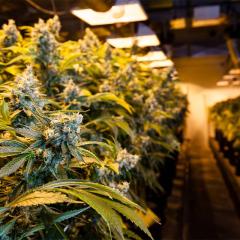As she walks across the graduation stage today to accept her Bachelor of Economics and Bachelor of Business Management testamurs, Amelie Groves will take her first steps towards challenging the status quo.
Ms Groves is a fierce advocate for conservation with a deep respect for the natural environment. Although she began her UQ journey as business student, she was inspired to pair it with economics to help her take on environmentally harmful public policy and business decisions.
“At a pretty young age I understood how our actions and way of life were impacting the environment and the implications this will have in our future, so ever since then protecting the environment has been my top priority,” she said.
“I was frustrated with the decisions made by those in power – both on a macro and micro level – because as I saw it, economic activities usually come at a cost to the environment.
“In my first year at UQ I had the cliché epiphany that ‘if you can’t beat them, join them’, so I decided to add a Bachelor of Economics on top of my Bachelor of Business Management.
“My thought was that an economics program would help me understand the reasoning for these decisions and communicate effectively with people who would no doubt challenge my views. I was also interested to see if there was a way economists and conservationists could work with one another – something I’m optimistic about.”
This decision paid off. In her second year, Ms Groves chose to major in Natural Resources and Environment (Economics) and Sustainability (Business Management), and dove into extracurricular activities and internships where she could explore her passion for conservation.
Earlier this year, Ms Groves participated in the Faculty of Business, Economics and Law’s Community Engagement Program, leading a team in developing a sustainable business plan for the Oxley Creek Catchment Association’s Biodiversity Services division.
She has also interned for the Great Barrier Reef Foundation and The Good Beer Co, a Brisbane-based beer company and social enterprise that raises money for charitable causes such as the Australian Marine Conservation Society.
For Ms Groves, the highlights of her studies were the ‘a-ha moments’ when everything she had been learning clicked into place.
“In the School of Economics you build a lot on previous courses, and I found many links between economics and the sustainability courses I have been studying through business management,” she said.
“It was so great to see everything come together – like finishing a really big puzzle.”
As for her future plans, the sky is the limit.
“There is still so much to learn outside of uni so I would like to get as many varied experiences as possible,” she said.
“Sustainability consulting is currently the most attractive path because it would give me an opportunity to work in a range of different sectors and projects, but I’m also interested in the renewable energy sector, a job in local, state or federal government, or in natural resource or carbon management.”
Ms Groves credits UQ for giving her the ability to forge ahead with her career dreams.
“I realised that to be able to create change you must understand the whole picture,” she said.
“My dual degrees have given me the foundations and building blocks to be able to see different perspectives. I studied a range of subjects from different faculties and learned from teachers and peers who are already doing great things.
“Because of this I have the tools and knowledge to do something meaningful.”
Environmental Economics (ECON3700) is one of the courses Amelie took during her studies. Students now wanting to enrol in this undergraduate course are only required to have completed Introductory Microeconomics (ECON1010). Visit Environmental Economics (ECON3700) for more information.



